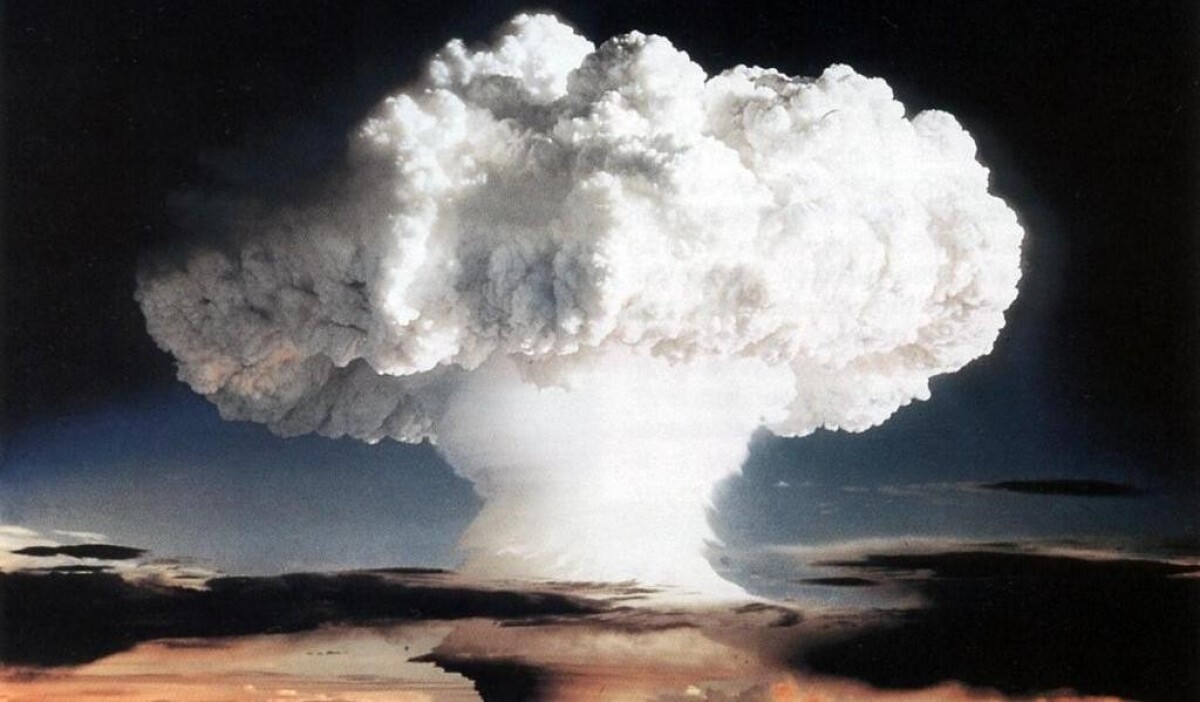
Kazakhstan's policy in the field of disarmament and non-proliferation of weapons of mass destruction (WMD) is determined by the foreign policy of the Republic, based on its commitment to strengthening international security, states, enhancing the role of international organizations in resolving global problems and conflicts.
The policy of the President of the Republic of Kazakhstan N. Nazarbayev aimed at delivering mankind from nuclear weapons and strengthening the WMD nonproliferation regime deserved recognition of the international community and consolidated Kazakhstan's global leadership in the field of disarmament, non-proliferation and nuclear safety.
The first steps of a Leader have become a new trend of global politics, that bar, at the very beginning of an independent path that many countries of the world are unable to overcome to this day. Nursultan Nazarbayev's initiative on convening the Conference on Interaction and Confidence-Building Measures in Asia was heard from the rostrum of the 47th session of the UN General Assembly in 1992.
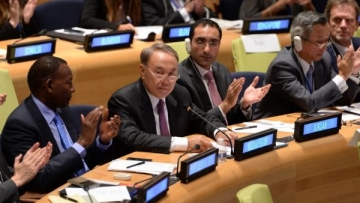
May 17-23, 1992 the first official visit of President N. Nazarbayev to the USA took place. One of the main topics of the talks in Washington was the legal status of the Agreement on the Reduction and Limitation of Strategic Offensive Arms (START) signed between the USSR and the USA.
On May 23, 1992 in Lisbon, representatives of Kazakhstan, Belarus, Ukraine, Russia and the United States signed the five-party Protocol, an additional protocol to the START-1 Treaty specifying the responsibility of these states for implementing the provisions of the START Treaty in relation to strategic nuclear forces deployed in territories of four republics. The Lisbon Protocol also contained commitments by Belarus, Ukraine and Kazakhstan to accede to the Treaty on the Non-Proliferation of Nuclear Weapons as non-nuclear-weapon States.
The Treaty on the Limitation of Strategic Offensive Arms (START I) - signed on July 30-31, 1991 in Moscow, entered into force on December 5, 1994. The START-1 Treaty expired on December 5, 2009.
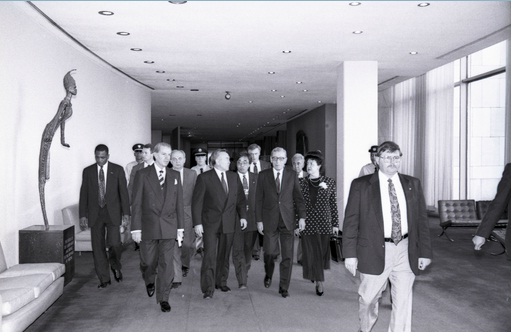
The head of state visited the UN headquarters for the first time / Akorda photo archive
The essence of the additional protocol to the START I Treaty was:
- Belarus, Ukraine and Kazakhstan pledged to accede to the Treaty on the Non-Proliferation of Nuclear Weapons as non-nuclear states "as soon as possible";
- this protocol must be approved by the parties together with the START II Treaty, signed by George W. Bush and Boris Yeltsin in January 1993 and prohibiting the use of ballistic missiles with separable warheads and never entered into force;
- it was stated that the nuclear weapons of the former USSR "will remain under the safe, strict and reliable control of a single joint command";
- all four states - Russia, Ukraine, Belarus and Kazakhstan - were recognized as parties to the START I Treaty and assumed obligations arising from it.
By signing the Lisbon Protocol Ukraine, Kazakhstan and Belarus were recognized as parties to START I, joined the NPT and were listed as non-nuclear-weapon states. All the strategic nuclear warheads on their territory they committed to liquidate or transfer to Russia.
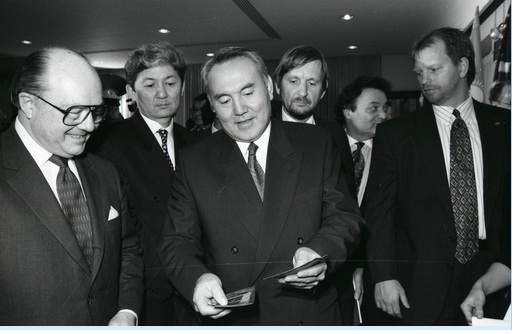
N. Nazarbayev in the USA / Akorda photo archive
In accordance with the Lisbon Protocol, Kazakhstan, Belarus and Ukraine, as the successor states of the former USSR, in connection with the START Treaty, agreed, together with Russia and the United States, to participate in the work of the Joint Commission for Compliance and Inspections (SCSI). These countries also agreed to conclude agreements on the implementation of the limits and restrictions set by the Treaty with respect to the funds covered by the Treaty. On July 2, 1992, Kazakhstan ratified the START Treaty and the Lisbon Protocol, which became an integral part of the Treaty. In December 1993, the Supreme Council of the Republic of Kazakhstan ratified the Treaty on the Non-Proliferation of Nuclear Weapons.
Accession to the NPT was one of the biggest events in the foreign policy of our country. The world community welcomed this action. Many states noted that Kazakhstan visually demonstrated its responsibility and maturity in international affairs, aspiration for constructive participation in solving the biggest problems of our time.
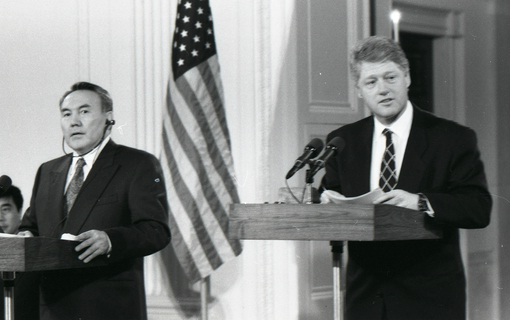
N. Nazarbayev and B. Clinton / Akorda photo archive
Kazakhstan was the first among the participants of the Lisbon Protocol to implement the provision concerning the movement of nuclear munitions. On May 30, 1995, the last test nuclear charge that was in the tunnel at the Semipalatinsk test site was destroyed. On April 21, 1996, the process of withdrawal of 1,216 nuclear weapons from the territory of the Republic of Kazakhstan lasted more than a year. Kazakhstan's land has forever got rid of the deadly nuclear legacy.
Having fulfilled its obligations on the withdrawal of the nuclear arsenal, our country faced another problem - the destruction of the infrastructure of nuclear weapons on the Kazakhstani land and the transfer of former military productions to peaceful tracks. Under the auspices of the IAEA, a Coordination Plan for Technical Assistance to Kazakhstan on the organization of a state system for accounting for and control of nuclear materials, the operation of nuclear power plants, and the physical protection of nuclear materials and installations was developed. Participants in this project were the United Kingdom, the United States, Sweden and Japan.
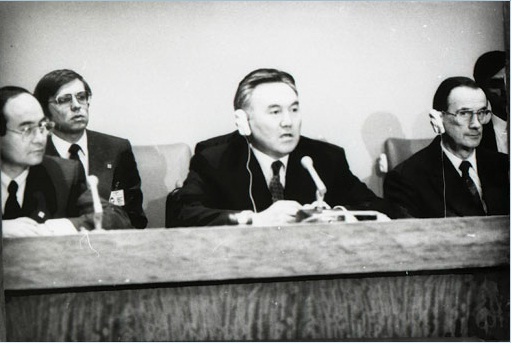
President of the Republic of Kazakhstan at the 47th session of the General Assembly of the United Nations in New York, USA / Akorda photo archive
Translated by Raushan MAKHMETZHANOVA
